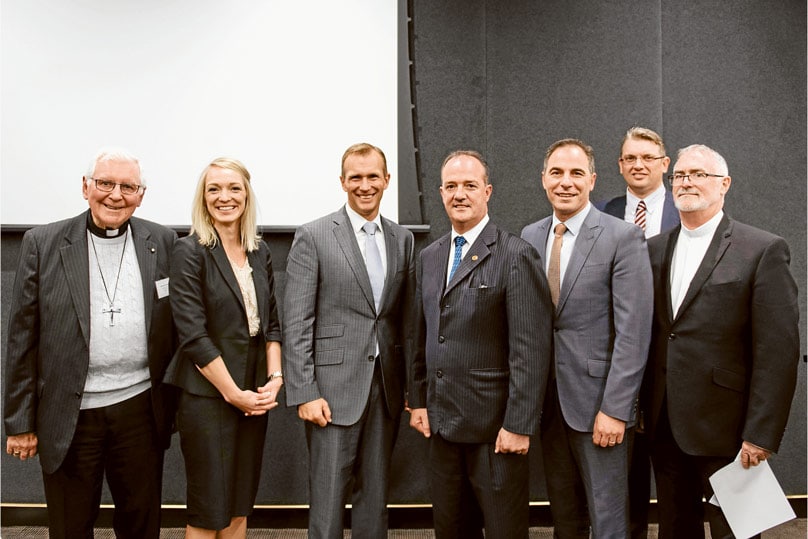
The independent review of Special Religious Education (SRE) recently released by the NSW Government has provided strong evidence that highlights the incredible contribution made by parish catechists (SRE teachers) to the religious education of young people in public schools.
Representatives from most major providers of SRE across all faiths gathered at NSW Parliament House on 30 May with the Education Minister Rob Stokes, Shadow Minister Jihad Dib, and other members of parliament, to be presented with a summary of findings by one of Australia’s leading research agencies, McCrindle, into the NSW Government’s independent review of SRE.
Most striking amongst the research presented by Eliane Miles of McCrindle was the levels of satisfaction regarding SRE from schools and parents.
The research presented showed that of the 780,600 students that attend the 2,152 government schools in NSW – with SRE taught in 87 per cent of these schools – 84 per cent of parents are satisfied or mostly satisfied with their student’s learning experiences in SRE.
Other results were just as encouraging and in stark contradiction to criticisms of SRE by a small – but vocal – minority who have been aided in their criticism by unfair and unbalanced reporting in the mainstream media. Some of the other results include:
– 96 per cent of principals agree or mostly agree that their school has a good working relationship with SRE providersl 95 per cent of SRE teachers utilise authorised materials and workbooks
– Between 80-90 per cent of SRE providers have essential training elements in hand, with 91 per cent receiving yearly training updates
– 92 per cent of parents agree or mostly agree that they understand their right to withdraw their child from SRE
The Review highlighted how SRE contributes to students’ understanding of their cultural heritage and is an avenue for their spiritual care.
It noted that the work of SRE teachers builds tolerance in schools, promotes multiculturalism, contributes to a well-rounded education, and connects schools with their local community.
“It is wonderful that we have in our schools an understanding that humans are made up of three parts, mind, body and spirit, and we need to provide sustenance to each part of what makes us fully human. SRE has a very important role to fulfil in our schools,” Mr Stokes said.
“I am truly grateful for all that you do … who knows how many lives have been impacted and changed for the better by the work they [SRE teachers] have done,” he told SRE representatives attending the gathering.
Mr Dib expressed strong bipartisan support for the value of SRE.
“[The review] was not at any point in time thinking how to do away with it, but rather, how we actually improve it,” he said.
Thanking SRE teachers and providers, he emphasised the importance of ensuring that “Every single student should have an opportunity – for at least one hour in a week – to reflect about the person that they are and the way that they can actually better themselves.”
An estimated 5,000 Catholic parish catechists see around one in five students in NSW public schools.
Representing the Catholic Church as the largest single provider of SRE in NSW, Bishop Peter Ingham from the Diocese of Wollongong gave a vote of thanks to Mr Stokes, Mr Dib, host Mr Paul
Green from the Christian Democratic Party, and all MPs who attended, on behalf of all major providers across all faiths.
“For providers of SRE, there is much to celebrate in the findings of the Review and it will prove enormously helpful in highlighting areas that might need to be strengthened and improved so as to make Special Religious Education even better,” Bishop Ingham said.
SRE providers have eagerly awaited the findings of the independent review into SRE. All major faiths keenly cooperated in the review process, quietly confident that it would show how seriously providers take SRE, as evident in the resources they pour into developing curriculums, resources and training.
In particular, Bishop Ingham noted how, “Most major providers already have the key recommendations in hand,” including ease of public access to curriculum outlines and training in effective teaching practices.
Bishop Ingham also explained how the major faiths – including the Christian denominations – had effectively pre-empted the results of the review with the establishment in 2016 of a multi-faith group for SRE to “support all faiths through resource sharing of such things as policy and process documents, teacher training, curriculum development, and support”.
Bishop Ingham concluded the evening, noting that the existence of SRE in NSW was indicative of “a mature and inclusive education system” and thanked everyone “for their support of choice for parents, and for their trust of all major religious traditions to deliver increasingly high quality faith formation for young people”.
